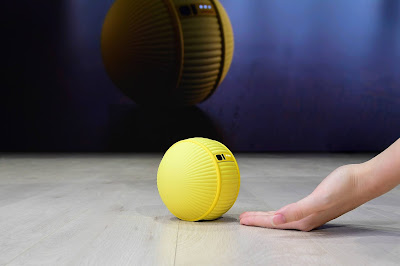We have a variety of smart home audio assistants like Google Home, Alexa to name a few. They help us in our day to day life and remember things for us and control our smart home devices. Ballie is the electronics brand's response to this demand for more human-centric innovation, which aims to enhance the wellbeing of consumers by catering to their individual needs. In the Consumer Electronic Show 2020 in Las Vegas, Samsung introduced Ballie, a small ball-shaped robot intended to help you around the house. Samsung says Ballie utilizes AI to be a security robot, a fitness assistant, a tool to help seniors connect with smart devices in their homes, and it can even be a friend to your kids and pets. Consumers have entered the "age of experience", where hardware and software merge to deliver personalised experiences that make life easier and more enjoyable.
 |
| Samsung's Ballie-AI in the self-care |
The device uses a mobile interface, on-device artificial intelligence (AI) capabilities, voice activation and an in-built camera to recognise and respond to its users, and help them with various household tasks. It responds to spoken demands as a pet might, but can be used as a wakeup call, a fitness assistant, to record moments or to manage other smart devices in the home like TVs and vacuums. It can also keep real pets company when owners are out of the house.
Samsung’s Ballie is an interesting combination between the smart home device and a robotic companion. The ball-shaped gadget, equipped with cameras and sensors used to follow you around, can control various smart home features, take photos, send you updates about your home when you’re away, and even function as a fitness assistant. Designed to be an “all-around life companion,” Ballie might be cute enough to give your pup a run for its money.
In an onstage demo, Ballie followed Samsung consumer electronics division CEO H.S. Kim on the stage by rolling around, seemingly by using the camera to track Kim as he walked across the stage. Ballie also gave cute little robotic chimes in response to a couple of commands from Kim, and it even rolled right into Kim’s hands when he called for it.
 |
| Samsung CEO H.S Kim in CES 2020 |
Ballie is Samsung’s human-centric vision of robots that takes personalized care to the next level. Samsung didn’t share any information about when Ballie might come out or how much it might cost when it’s available, so it’s hard to know if we can ever get the chance to see if it will live up to Samsung’s bold vision that it presented at CES. But for now, it at least looks like a cute little robot that could be a companion around the house — that is, if it’s something you’ll actually be able to buy.
The device uses a mobile interface, on-device artificial intelligence (AI) capabilities, voice activation and an in-built camera to recognise and respond to its users, and help them with various household tasks. It responds to spoken demands as a pet might, but can be used as a wakeup call, a fitness assistant, to record moments or to manage other smart devices in the home like TVs and vacuums. It can also keep real pets company when owners are out of the house.
Comments
Post a Comment